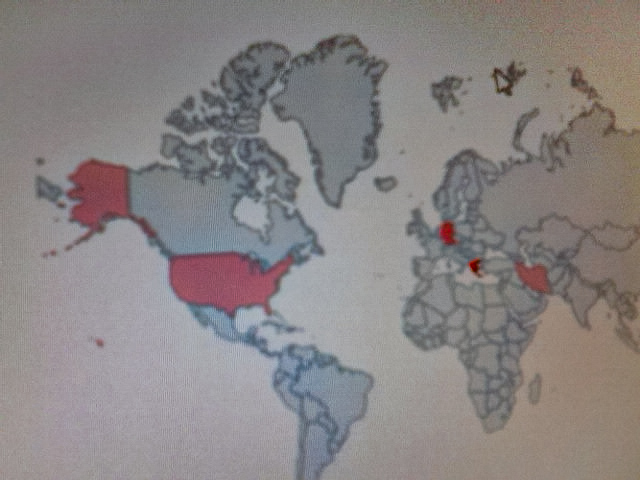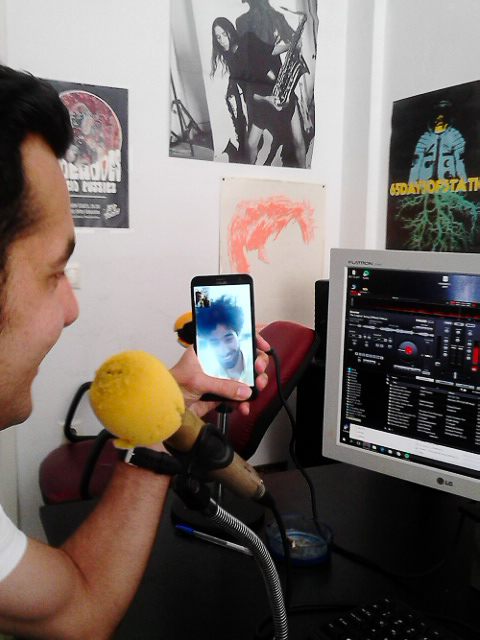A refugee radio show, uniting the world: Every Friday, June 2-4, on the welcoming Internet radio Indiegroundradio.com, distinguished for its social sensitivity. The title of the show: “Many heads, one sound (abroad cast from refugees’ hearts to everyone’s ears)”.
In the musical selections, djing and the microphone, are young refugees from Iran and Afghanistan. The songs are Iranian, American, and French hip hop, but also pieces from the musical tradition of their countries.
The listeners, relatives who are waiting for them in America, friends who are in the Malakasa camp, close friends in an apartment in Attica, one’s uncle in Berlin, another’s mother in Tehran, a third’s sister in Kabul, and many, many others.
“It’s the magic of live streaming! You play all over the planet at the same time! The young refugees in Greece alert friends and family around the world about the time of the broadcast and a merry-go-round of communication begins.
They send greetings, receive messages, and chat on Viber with their families. It is proven in practice that music unites,” says Lykourgos Papamixail, male engagement expert of the Diotima Center, responsible for the whole effort.

Djing lessons
“Hasan, Massoud, Amin, Mossadih, Erfen, Hossein, Mehdi, all youths – between 16 and 22 years old, beneficiaries of the Velos Youth organization, were amateurs until now. They had nothing to do with controllers, consoles, mixers, etc.
Since May 2019, however, for a month and a half every Thursday at Velos, they have been attending systematic djing classes, which we gave them together with the radio producer George Michalopoulos from En Lefko 87.7 FM. The idea of the radio show was an extension of these lessons so that they could test what they had learned, all taking turns behind the station’s microphones and consoles.”
“In the classes we approached the knowledge and techniques of djing in various interactive ways, as well as, using audio-visual means, making sure that the material we use is inclusive regarding genders and sexualities.
The excitement of the boys was intense. Characteristic was the stability and consistency of the group, which consisted of 8 to 10 people. Some even learned and developed very quickly and are even ready for professional djing.”
Behind the microphone
The next step, as we said, was to get behind the microphones. “The shows were divided into two parts. The first hour was undertaken in groups by those who had attended the Djing Workshops and the second by whoever had a set in mind.”
The deal was simple: “They would say whatever they wanted, to whoever, in whatever style, in whatever language they wanted. Thus, some young Afghans played traditional pieces without speaking. Other children from Iran presented their songs in English.
Afghan youths sang in Farsi, doing something like impromptu karaoke. A young man from the Congo, who loves French anti-authoritarian hip-hop, sang with his eyes closed, all the lyrics of the tracks he put on.
Another was addressing the Greeks and telling them he loved them, another was expressing his complaints, another was joking asking his mother in Kabul not to be late in sending him money, another was making fun of his best friend and another was singing the Iranian happy birthday to his son, who listened to him together with his wife live from Tehran. So these radio shows were very powerful experiences for everyone.”

Male inclusion
But what does all this have to do with the actions of the Diotima Center for gender-based violence? An organization that deals primarily with women?
“Let’s start from the beginning: The agency’s interventions regarding gender-based violence in the refugee population, which have been implemented since 2018, include “male engagement” actions. In essence, these are actions and workshops for male refugees.
Given that in the vast majority of cases the perpetrators are men – whether it is the abuse of women, vulnerable individuals, or even other men (e.g. in hostilities where one side “humiliates” e.g. sexually the leader of the other) – our goal is to prevent such incidents.”
“However, opening such a dialogue is not an easy task. It was necessary to first create a relationship with this population, to “soften” the hard core of suspicion and frustration that these people feel towards everyone and everything. For this reason, we organized a series of creative actions, with the aim of gradually bringing this whole process to the workshops”.
Reflection on gender stereotypes
“In the workshop sections, we approach issues of equality, human rights, gender stereotypes, gender violence, but also issues of citizenship. The starting point every time is the stereotypes and from there on we touch on as many topics as we can in every meeting”.
“In this way, we try to push them to think about what elements constitute the male subject involved in incidents of gender-based violence. To lead them to rethink their relationship with themselves, their masculinity, and the images and expectations of male identity, which they have been inculcated by their parents, relatives, and the societies in which they grew up. To reflect on the patriarchy which they are probably re-enacting”.
“The discussion is more experiential than theoretical. Through examples, we approach concepts such as biological and social sex, etc. In fact, I choose the examples to come from the Greek area.
To be precise, I talk to them about the city I come from, Argos, which is a conservative city. They thus understand that the patriarchal culture is a universal system, touching both the West and the East.
This way, men and young people get a mental space to talk about how patriarchy is entrenched in their own countries. They deposit their own deep stereotypical images and we try to see where they come from.’
“When the seminars are closed and it is fully understood that stereotypes, laws, perceptions, and ideas of people at some historical moment change, I feel really happy, that we have found a goal.”
From the camps to the urban fabric of Athens
“We started the actions and workshops for male refugees in the Malakasa camp in January 2018 until June. We operated various workshops and activities (carpentry, music, and sports activities) and then, from the summer of 2018 until today, our action was transferred to the urban area of Athens.
All these actions are carried out in the framework of the “Program for the prevention and response of gender-based violence in the urban fabric” which is implemented with the support of the UN High Commissioner for Refugees. In order to reach the male population living scattered in Athens, we have collaborated with a number of organizations or institutions, which are a point of reference for male or young refugees. In particular, we have collaborated with: Arsis, Generation 2.0, Velos Youth, Elix as well as various housing agencies in Athens, Thessaloniki, Karditsa, and Trikala”.





